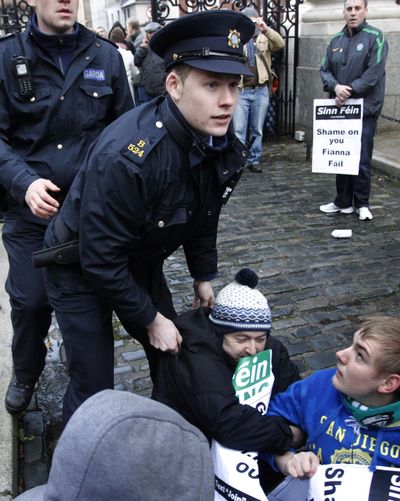Ireland’s leader won’t step down
Cowen seeks to finalize bailout before facing calls for ouster

DUBLIN – The Irish government stood on the brink of collapse Monday, a day after being forced to accept a massive bailout from the European Union and the International Monetary Fund.
Irish Prime Minister Brian Cowen said he would call an election for early next year, once Ireland passes an emergency budget and finalizes the bailout.
The admission represented a huge political blow to Cowen, who only days ago was denying even the need for a bailout to solve the problems brought on by Irish banks’ reckless speculation in overpriced real estate.
His coalition partner, the Green Party, forced his hand, saying it would quit the government and then demand an election in January. Cowen resisted pressure to resign immediately, but soon even lawmakers in his own Fianna Fail party also called on him to go.
Cowen said he could not quit now because that would delay Ireland’s deficit-slashing 2011 budget and the bailout negotiations – and jeopardize efforts to sustain the nation’s cash-strapped banks.
He insisted he would step down and face re-election only after Ireland’s most brutal budget in history is passed and talks with the International Monetary Fund and the European Central Bank produce a bailout deal expected to approach $135 billion.
The EU’s economic and monetary affairs minister said nothing should slow Ireland’s passage of its budget and the negotiation of a bailout.
“It is essential now to stop the financial bush fire concerning Ireland before it becomes a European-wide forest fire,” said Olli Rehn, the EU minister most closely involved in helping eurozone governments control their deficits and finance their debts.
Analysts say Cowen faces an uphill struggle even to clear the first hurdle of the budget process on Dec. 7, when the spending plan is unveiled and faces an initial vote.
Ireland’s rescue, which follows a Greek bailout in May, is the European Union’s latest attempt to win back market confidence and keep its 16-nation euro currency strong and stable. But the cost – both monetary and political – keeps rising by the day.
Experts said Monday the bailout would do little to shield other heavily indebted countries from the risk of eventual default, most immediately Portugal but also potentially Spain, Italy and Greece.
Cowen said he would call an election once the budget is fully passed but declined to specify any date. Several budget votes are not expected until late January or February, which under Cowen’s terms would mean an election in March – long after analysts expect him to be forced from office.
Cowen said Ireland cannot afford the three-week delay needed to hold a national election now.
“Any further delay in this matter would in fact weaken our country’s position,” Cowen said on the steps of his office with senior Cabinet ministers.
Not proceeding with the budget next month “would do grave damage to our interests,” he said.
Amid rising disgust with Cowen’s handling of the crisis, activists from the Irish nationalist Sinn Fein party stormed the entrance to Cowen’s central Dublin office Monday and scuffled with police.